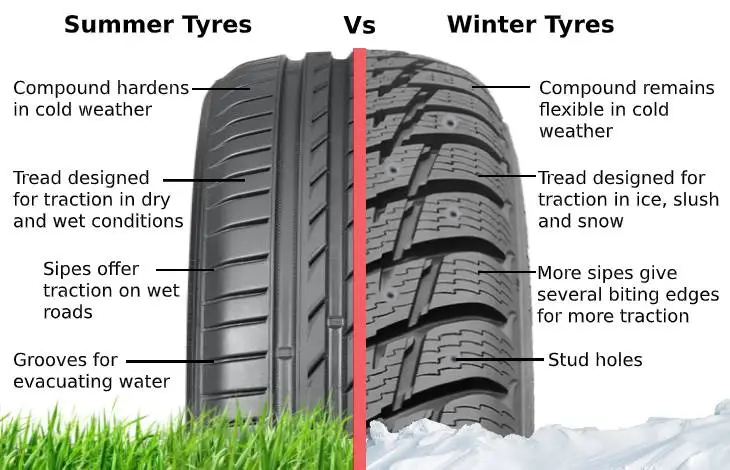As the temperatures drop and winter approaches, ensuring your vehicle is equipped to handle the challenges of icy and snowy roads becomes a top priority. One of the most crucial components for safe winter driving is a set of winter tires.
Unlike all season or summer tires, winter tires are specifically designed to provide better traction, handling, and braking performance in cold and harsh conditions. They are made with unique rubber compounds and tread patterns that remain flexible in low temperatures and effectively channel away snow and slush.
Understanding the importance of winter tires can significantly enhance your safety and driving experience during the winter months. Here are five compelling reasons why winter tires are a must for winter driving.
1. Improved Traction on Snow and Ice
Winter tires are engineered to provide superior traction on snow and ice, which is essential for maintaining control and stability on winter roads. The rubber compounds used in winter tires remain flexible at low temperatures, allowing them to grip the road surface more effectively.
Additionally, the tread patterns on winter tires are designed with deeper grooves and more aggressive sipes, which help channel snow and slush away from the tire and improve contact with the road.

The enhanced traction provided by winter tires reduces the risk of slipping and sliding, especially when accelerating or braking. This is particularly important on icy roads, where losing traction can lead to dangerous situations.
Winter tires also offer better performance on packed snow, providing the necessary grip to go through challenging conditions. By equipping your vehicle with winter tires, you can ensure a safer and more controlled driving experience, even in the harshest winter weather.
2. Shorter Braking Distances
One of the most critical safety benefits of winter tires is their ability to significantly reduce braking distances on snowy and icy roads. The specialized rubber compounds and tread patterns of winter tires enhance their grip on cold surfaces, allowing them to stop more quickly and effectively than all-season or summer tires. This can make a crucial difference in emergency braking situations, helping you avoid accidents and collisions.
Studies have shown that winter tires can shorten braking distances by up to 30% compared to all-season tires in winter conditions. This means that a vehicle equipped with winter tires can come to a complete stop much sooner, reducing the likelihood of rear-end collisions and other accidents.
The improved braking performance of winter tires is particularly important when driving in urban areas with frequent stops and starts, as well as on highways where higher speeds can increase stopping distances.
By investing in winter tires, you can enhance your vehicle’s braking performance and ensure that you have the stopping power needed to stay safe on winter roads. The peace of mind that comes with knowing your vehicle can stop quickly and reliably in adverse conditions is invaluable for drivers during the winter months.
3. Enhanced Handling and Stability
Winter tires are designed to provide better handling and stability in cold and slippery conditions, ensuring that you maintain control of your vehicle even on challenging winter roads.
The flexible rubber compounds and specialized tread patterns of winter tires allow them to adapt to the road surface, providing consistent traction and stability. This is especially important when going through curves, corners, and inclines, where maintaining control can be more difficult.
The deeper grooves and aggressive sipes on winter tires help improve grip and reduce the likelihood of hydroplaning, which can occur when driving through slush or standing water. The improved handling provided by winter tires enhances your ability to steer and maneuver your vehicle, making it easier to avoid obstacles and go through snow covered roads.
In addition to better handling on snow and ice, winter tires also offer improved performance on cold, dry pavement. The rubber compounds used in winter tires remain pliable in low temperatures, providing better traction and responsiveness compared to all season tires, which can become stiff and lose grip in cold weather. By equipping your vehicle with winter tires, you can enjoy a more stable and controlled driving experience throughout the winter season.
4. Increased Tire Life
Using winter tires during the colder months can help extend the life of your tires by ensuring that each set of tires is used in the conditions they are designed for. All-season and summer tires are not optimized for winter driving and can wear out more quickly when used on snow and ice. The rubber compounds in these tires can become brittle in low temperatures, leading to increased wear and reduced performance.
By switching to winter tires during the winter months, you can preserve the tread life of your all-season or summer tires, ensuring that they remain in good condition for use in warmer weather. This seasonal rotation of tires not only improves safety and performance but also provides better value by extending the life of both sets of tires.
Additionally, winter tires are specifically designed to withstand the harsh conditions of winter driving, including cold temperatures, snow, and ice. The durable rubber compounds and reinforced tread patterns of winter tires ensure that they wear evenly and maintain their performance over time. By investing in winter tires, you can enjoy the benefits of enhanced safety and extended tire life, making it a cost-effective choice for drivers who want to get the most out of their tires.
5. Legal Requirements and Insurance Benefits
In many regions, the use of winter tires is mandated by law during the winter months. These regulations are put in place to enhance road safety and reduce the risk of accidents caused by inadequate tire performance in snowy and icy conditions. Failure to comply with winter tire regulations can result in fines and penalties, as well as increased liability in the event of an accident.
Equipping your vehicle with winter tires not only ensures compliance with legal requirements but can also provide insurance benefits. Some insurance companies offer discounts on premiums for vehicles equipped with winter tires, recognizing the improved safety and reduced risk of accidents. These discounts can help offset the cost of purchasing winter tires, making it an even more attractive investment.

It’s important to check the specific regulations and insurance policies in your area to understand the requirements and benefits associated with winter tires. By staying informed and compliant, you can enhance your safety on the road and potentially save money on insurance premiums.
Winter tires are a must for safe and reliable driving in winter conditions. They provide improved traction, shorter braking distances, enhanced handling, increased tire life, and compliance with legal requirements and insurance benefits. By investing in winter tires, you can ensure a safer and more enjoyable driving experience during the colder months.

